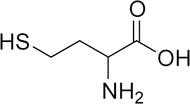Importance Of Homocysteine Monitoring
Posted by DS DC on Aug 11th 2022
Anyone interested in keeping tabs on their health status will want a routine blood test. A decent, routine, screening blood test will also test for homocysteine, the main topic of this article.
Get Your Blood Test With a Homocysteine Check
We check homocysteine because it gives us information about the general state of inflammation in the body. People with elevated homocysteine levels are more likely to have problems with their arteries and keep in mind that you are only as old as your plumbing.
Problems Related to High Homocysteine
When you think of high homocysteine you should be thinking of some pretty scary problems like blood clots, heart attacks and strokes and brain problems like dementia and Alzheimer’s. Some studies link high homocysteine during pregnancy to neural tube defects (the part that becomes the brain and spinal cord) and sometimes early stages miscarriage.
Homocysteine Interferes With Nitric Oxide
Research also indicates that homocysteine interferes with the production of NO or nitric oxide that is essential for things like artery flexibility, blood pressure regulation, erectile tissue function, heart rhythm and other life critical activity. So part of the damage that higher levels of homocysteine leads to is at least in part due to problems with NO in your body.
We Like Homocysteine to Be Low Normal
Your lab and doctor will tell you that you are OK as long as your homocysteine doesn’t exceed 15 (micro mol/l). Researchers into degenerative diseases tell us that anything over 7 is not acceptable if you want to reduce your risk of those problems listed above.
Homocysteine is not a dietary amino acid in significant quantity but is made from another amino acid, methionine. If you want to know more, you can search for images of methylation pathways. Prepare to have your eyes glaze over from the complexity of even the simplified versions.
Simple Steps to Lower Homocysteine
But just because the pathways are complex doesn’t mean that we can’t have some valuable take-away lessons.
The first take-away is that your ability to maintain a healthy homocysteine level decreases with age.
People with higher homocysteine levels tend to have several of the following:
Tiredness
Decreased stamina
Unstable weight
Frequent physical pains like arthritis, muscle aches and/or headaches
Frequent colds
Deteriorating eyesight
Decreased mental clarity
Sleeping issues
Factors that can contribute to high homocysteine are:
Insufficient folate, B6, B12, betaine, B2 and/or magnesium
High meat and dairy diet
Smoking
Coffee
Alcohol
Age
Obesity
That is what you can do to increase homocysteine and increase your chances of strokes, heart disease and brain degeneration.First get a blood test. If you are above 7, what can you do to begin lowering this high-risk component?
Start with lowering your intake of red meat and also lower your dietary intake of dairy products.
Get regular exercise.
Decrease or eliminate alcohol and coffee.
Supplements Help But You Need Lifestyle Too
Supplements can make a big difference in conjunction with dietary and other life style changes. Keep in mind that although we have a supplement company, I won’t tell you that supplements can make up for bad life choices.
L-methylfolate-don’t take folic acid which is a synthetic version and probably has no beneficial effect on homocysteine reduction.
We Like Hydroxy B12
Hydroxy B12-some people do OK with methyl B12 but people with chronic issues will do better with hydroxy B12 (also known as hydroxyocobolamin). If your body wants the methy B12 (methylcobolamin) it can be readily converted from the hydroxy B12 you are taking.
NAC (N-acetyl cysteine) – NAC can displace homocysteine from its protein carrier which would seem to make it easier to remove from the body or convert to another form. Also NAC promotes the synthesis of cysteine and glutathione to give a big boost to the detox process.
SAMe (S-adenosylmethionine) promotes the conversion of homocysteine to cysteine, an important component of glutathione that in turn helps lower homocysteine.
Taurine-some research indicates that taurine can inhibit methionine absorption to help prevent so much methionine from being converted into homocysteine. Look for a reduction in homocysteine in just 4 weeks from taurine alone.
Omega-3 fatty acids-One of the ways that omega-3 fatty acids can help with inflammation is their effect on reducing elevated homocysteine as well as other boosting other anti-inflammatory effects.
TMG (trimethylglycine) and choline-choline is readily converted into TMG and TMG helps convert homocysteine back in to methionine, lowering homocysteine levels. Research also indicates that TMG helps reduce the inflammatory cytokine TNF-alpha.
Therefore a person interested in monitoring health related markers will want to be sure to add homocysteine into the mix. Much can be done with diet and supplements to help maintain healthy levels that will ultimately improve your probability of improved health.
